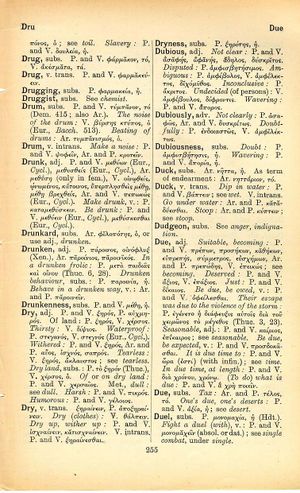duck: Difference between revisions
From LSJ
εἰ μὴ ἦλθον καὶ ἐλάλησα αὐτοῖς, ἁμαρτίαν οὐκ εἶχον → if I had not come and spoken to them, they would not be guilty of sin
(CSV4) |
m (Woodhouse1 replacement) |
||
| Line 1: | Line 1: | ||
{{Woodhouse1 | {{Woodhouse1 | ||
|Text=[[File:woodhouse_255.jpg|thumb|link={{filepath:woodhouse_255.jpg}}]] | |Text=[[File:woodhouse_255.jpg|thumb|link={{filepath:woodhouse_255.jpg}}]] | ||
Ar. [[νῆττα]], ἡ. | ===substantive=== | ||
[[Aristophanes|Ar.]] [[νῆττα]], ἡ. | |||
[[as term of endearment]]: [[Aristophanes|Ar.]] [[νηττάριον]], τό. | |||
===verb transitive=== | |||
[[dip in water]]: [[prose|P.]] and [[verse|V.]] [[βάπτειν]]; see [[wet]]. | |||
===verb intransitive=== | |||
[[go under water]]: [[Aristophanes|Ar.]] and [[prose|P.]] [[καταδύεσθαι]]. | |||
[[stoop]]: [[Aristophanes|Ar.]] and [[prose|P.]] [[κύπτειν]]; see [[stoop]]. | |||
}} | }} | ||
Revision as of 08:53, 20 May 2020
English > Greek (Woodhouse)
substantive
as term of endearment: Ar. νηττάριον, τό.
verb transitive
dip in water: P. and V. βάπτειν; see wet.
verb intransitive
go under water: Ar. and P. καταδύεσθαι.

